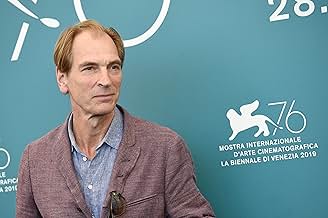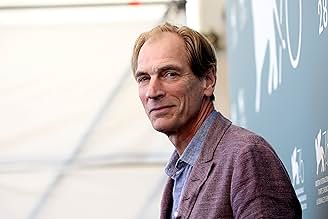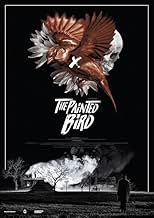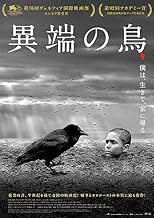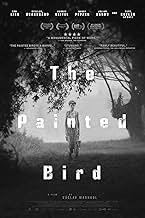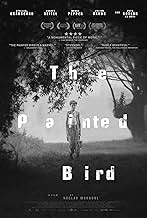IMDb RATING
7.3/10
8.3K
YOUR RATING
A young Jewish boy somewhere in Eastern Europe seeks refuge during World War II where he encounters many different characters.A young Jewish boy somewhere in Eastern Europe seeks refuge during World War II where he encounters many different characters.A young Jewish boy somewhere in Eastern Europe seeks refuge during World War II where he encounters many different characters.
- Awards
- 24 wins & 24 nominations total
Nina Sunevic
- Marta
- (as Nina Shunevych)
Marika Sarah Procházková
- Woman #1
- (as Marika Procházková)
Featured reviews
It's an eastern european movie at its core: raw, uncompromising, brutal, dim, hopeless and honest.
Brutality actually lead to several people leaving the screening I attended to at Venice 76. Here, this movie was labeled as '14+' but I believe it can be easily rated NC-17. The brutality of this movie includes some very graphic gore (although it's mostly present in the first half of the movie) and sexual-related violence (mostly implied but persistent throughout the film). I believe that, as of on-screen depiction of violence, this film probably outranks Schindler's List (although It isn't as vast scaled as Spielberg's film).
Stylistically, this film uses mostly the visual medium rather than conversations to provide information to the viewer. Dialogue becomes secondary at a point where the main character maybe utters a couple of lines throughout the movie, and some of the characters he meets with are entirely silent (Skasgard's character, for example).
The film has a very precise structure: it is made up of 8 chapters, each entitled after a character that the kid meets with, and each chapter reaches a moment when the screen fades to black. After that, a sort-of connective sequence displays the events that lead the kid to change his whereabouts. Among the characters he meets, the audience might recognize Alexander Skasgard, but also Harvey Keitel (in an entirely czech-speaking role) as well as Barry Pepper and german actor Udo Kier.
I wouldn't say that The Painted Bird is a holocaust or ww2 movie, or better, it isn't only that. Thematic elements that relate to either the Holocaust or the War, with the exception of a german plane seen early on, come up only after around one hour in-movie. Before that, whatever happens is mostly related to a strongly rural and superstitious society.
The Painted Bird pays implicit homage to several Eastern European films. The opening sequence mimics the one seen in Jan Nemec's "Diamonds of the Night", a lot of settings remind Elem Klimov's "Come and See" and Tarkovsky's "Ivan's Childhood", the overall fatalist tone reminds strongly of Bela Tarr's films.
It is an outstanding accomplishment, and I sincerely hope that this movie, despite its graphic content, receives enough recognition.
Brutality actually lead to several people leaving the screening I attended to at Venice 76. Here, this movie was labeled as '14+' but I believe it can be easily rated NC-17. The brutality of this movie includes some very graphic gore (although it's mostly present in the first half of the movie) and sexual-related violence (mostly implied but persistent throughout the film). I believe that, as of on-screen depiction of violence, this film probably outranks Schindler's List (although It isn't as vast scaled as Spielberg's film).
Stylistically, this film uses mostly the visual medium rather than conversations to provide information to the viewer. Dialogue becomes secondary at a point where the main character maybe utters a couple of lines throughout the movie, and some of the characters he meets with are entirely silent (Skasgard's character, for example).
The film has a very precise structure: it is made up of 8 chapters, each entitled after a character that the kid meets with, and each chapter reaches a moment when the screen fades to black. After that, a sort-of connective sequence displays the events that lead the kid to change his whereabouts. Among the characters he meets, the audience might recognize Alexander Skasgard, but also Harvey Keitel (in an entirely czech-speaking role) as well as Barry Pepper and german actor Udo Kier.
I wouldn't say that The Painted Bird is a holocaust or ww2 movie, or better, it isn't only that. Thematic elements that relate to either the Holocaust or the War, with the exception of a german plane seen early on, come up only after around one hour in-movie. Before that, whatever happens is mostly related to a strongly rural and superstitious society.
The Painted Bird pays implicit homage to several Eastern European films. The opening sequence mimics the one seen in Jan Nemec's "Diamonds of the Night", a lot of settings remind Elem Klimov's "Come and See" and Tarkovsky's "Ivan's Childhood", the overall fatalist tone reminds strongly of Bela Tarr's films.
It is an outstanding accomplishment, and I sincerely hope that this movie, despite its graphic content, receives enough recognition.
To be honest I had my doubts about this movie before watching it. A Czech black and white movie that is almost three hours long, it didn't look appealing to me, but after watching it I'm glad to admit I was wrong having those prejudices. The cinematography is stunning, certainly one of the best black and white movies I ever watched. Every shot is well thought of, beautiful work with the contrasts and shadows, dark images that fit perfectly with the very hard story. I get it that some viewers will hate it, it's not an easy movie to watch and not everybody is able to digest some of the brutal scenes. Personally I wasn't really bothered by it, it's just a movie, and those images contributed perfectly to the story. It's a story about constant abuse, the hard reality for some kids, whether you like it or not the war wasn't a nice period to live in, certainly not for a Jewish abandoned kid. Petr Kotlár did a stunning job playing his character, and even if there's not much talking in The Painted Bird you still get drawn into the story, mostly due to the excellent cinematography but also because of that very well chosen cast. Most of the actors are unknown to me, most of them look like they had a hard life (it changes from the usual goodlooking Hollywood actors we're normally bombarded with). Their faces showed the despair, the anger, the evil that was present in every character. If you watch this movie you will come to the conclusion there are no nice people in The Painted Bird. Beside the unknown cast I was surprised to see some very well known actors like Harvey Keitel, Stellan Skarsgård and others. They had smaller roles but were effective, and even if I doubt Harvey Keitel manages to speak Czech it looked all natural. The Painted Bird was a nice surprise to me, never expected that, but it's certainly not for everybody as the cruelty drips from every scene in this movie.
A young Jewish boy and the extreme abuse (quite hideous, alarming at times) and suffering inflicted upon him during WWII by some exceptionally evil and wicked people; slightly loses traction with a few too many frying pan fire cycles to emphasise the point, a shocking experience nonetheless, albeit a very long one. Whether the world still needs this kind of stylisation of the effects of war remains debatable, as does its impact on the memories and emotions already formed over so many years and by so many.
I am totally blown away by the sensitivities of audiences that go see Marvel movies where everything is blown up and destroyed and that's exciting but when a real art film comes out and it shows rapes other things that are difficult to watch but important to the plot and it's freak out time Because of this so-called PC correctness acting is forgotten everything is real and it's not it's not real it's made to look real so that you understand what the director and perhaps the screen writer and author is trying to say this is not a holocaust film per se the author did not even intend it to be 100% that it's a film depicting how life can unfurl in certain times of bleak history and how that can actually rebirth into a tale of man's every day existence The "violence" is necessary to relate the story.
Heavy. It's a series of chapters displayed by a photography both stunning and merciless. Human beings here are foundamentally cruel (with a couple of exceptions) and cruelty flows from the oppressor to the oppressed. The movie reminds us about that.
The ending has being discussed, but I think that, just maybe, the protagonist can still hope for a better future.
Did you know
- TriviaIn the 1960s, writer Jerzy Kosinski had become famous in Manhattan literary circles for his astonishing tales about the brutalities he had allegedly suffered during the Second World War. Abandoned by his parents at the age of six, he claimed he had roamed the countryside alone, witnessing rape, murder, and incest, constantly fearing for his life. Kosinski turned those stories into his first novel, "The Painted Bird", which, for a time, was considered a major work of Holocaust literature. Kosinski's claims were later debunked when it was revealed that he and his parents had all been sheltered by religious Poles who had never handed him over to the Nazis.
- GoofsAfter the old man died, Lubina rolled him face down in his grave. The next shot he lies face up.
- ConnectionsFeatured in CT na MFF Karlovy Vary 2019: Nabarvené ptáce (2019)
- SoundtracksFür Elise
Music by Ludwig van Beethoven
- How long is The Painted Bird?Powered by Alexa
Details
- Release date
- Countries of origin
- Official sites
- Languages
- Also known as
- The Painted Bird
- Filming locations
- Production companies
- See more company credits at IMDbPro
Box office
- Budget
- CZK 175,000,000 (estimated)
- Gross US & Canada
- $1,460
- Opening weekend US & Canada
- $452
- Jul 19, 2020
- Gross worldwide
- $659,535
- Runtime
- 2h 49m(169 min)
- Color
- Sound mix
- Aspect ratio
- 2.39 : 1
Contribute to this page
Suggest an edit or add missing content




